Treatment Resistant Depression: Ethical and Legal Considerations in Healthcare Organizations
VerifiedAdded on 2023/06/14
|8
|2559
|183
AI Summary
This article discusses the ethical and legal considerations in healthcare organizations while treating patients with treatment-resistant depression. It highlights the importance of autonomy and beneficence in care treatment and the need for effective communication and informed consent from patients and their families. The article also emphasizes the role of care providers in respecting patient values and preferences and developing a person-centered care approach. The case scenario of Mr. R is used to illustrate the breach of care principles and the absence of duty of care.
Contribute Materials
Your contribution can guide someone’s learning journey. Share your
documents today.
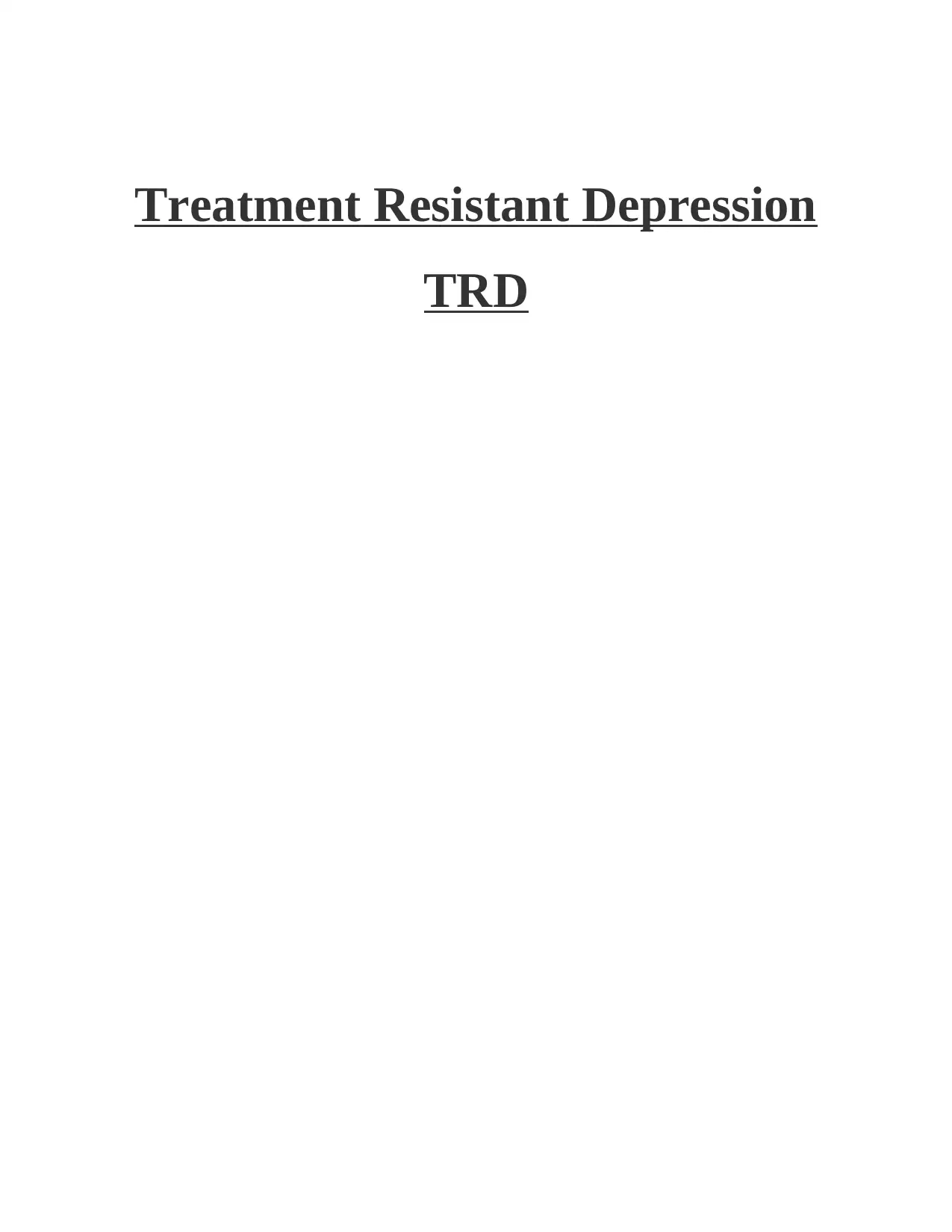
Treatment Resistant Depression
TRD
TRD
Secure Best Marks with AI Grader
Need help grading? Try our AI Grader for instant feedback on your assignments.
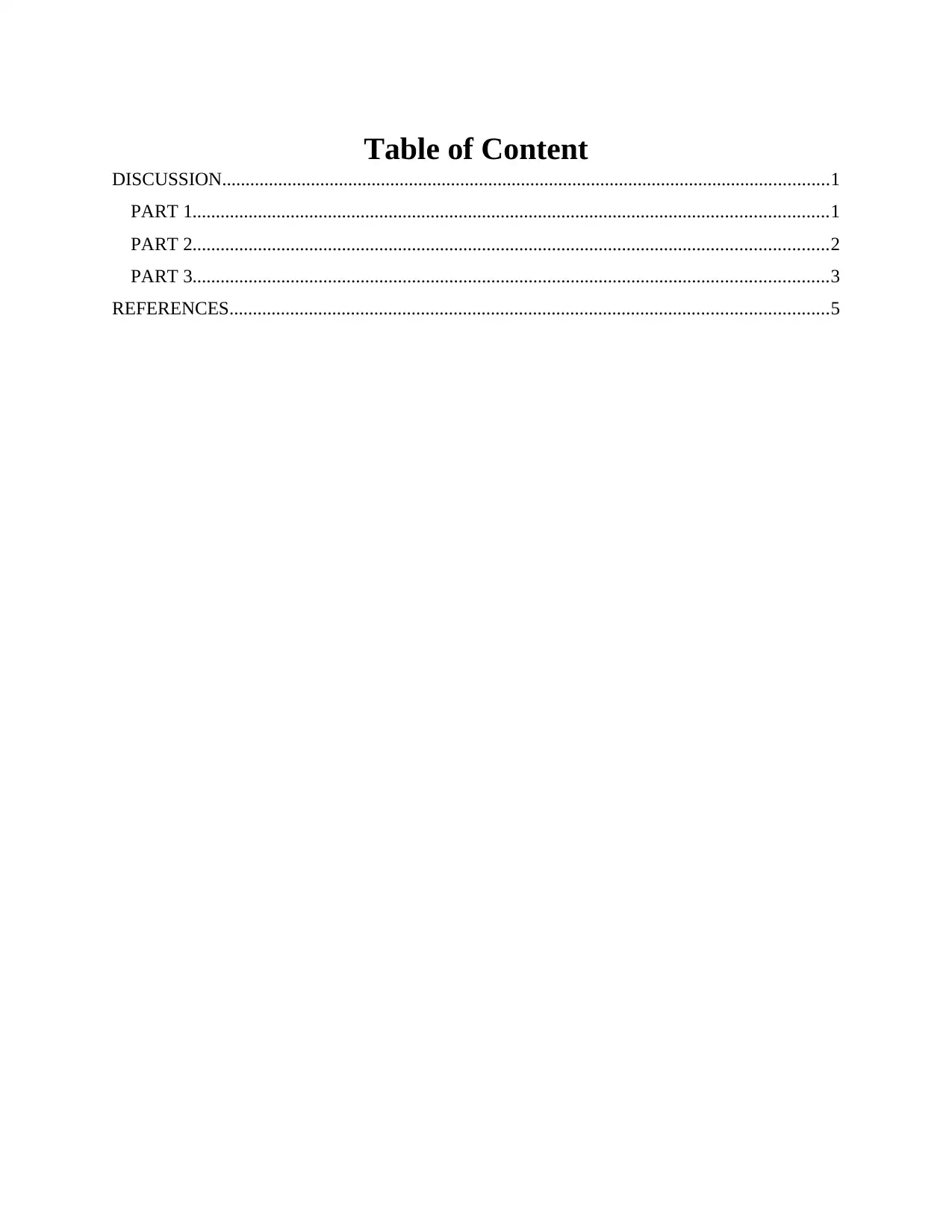
Table of Content
DISCUSSION..................................................................................................................................1
PART 1........................................................................................................................................1
PART 2........................................................................................................................................2
PART 3........................................................................................................................................3
REFERENCES................................................................................................................................5
DISCUSSION..................................................................................................................................1
PART 1........................................................................................................................................1
PART 2........................................................................................................................................2
PART 3........................................................................................................................................3
REFERENCES................................................................................................................................5
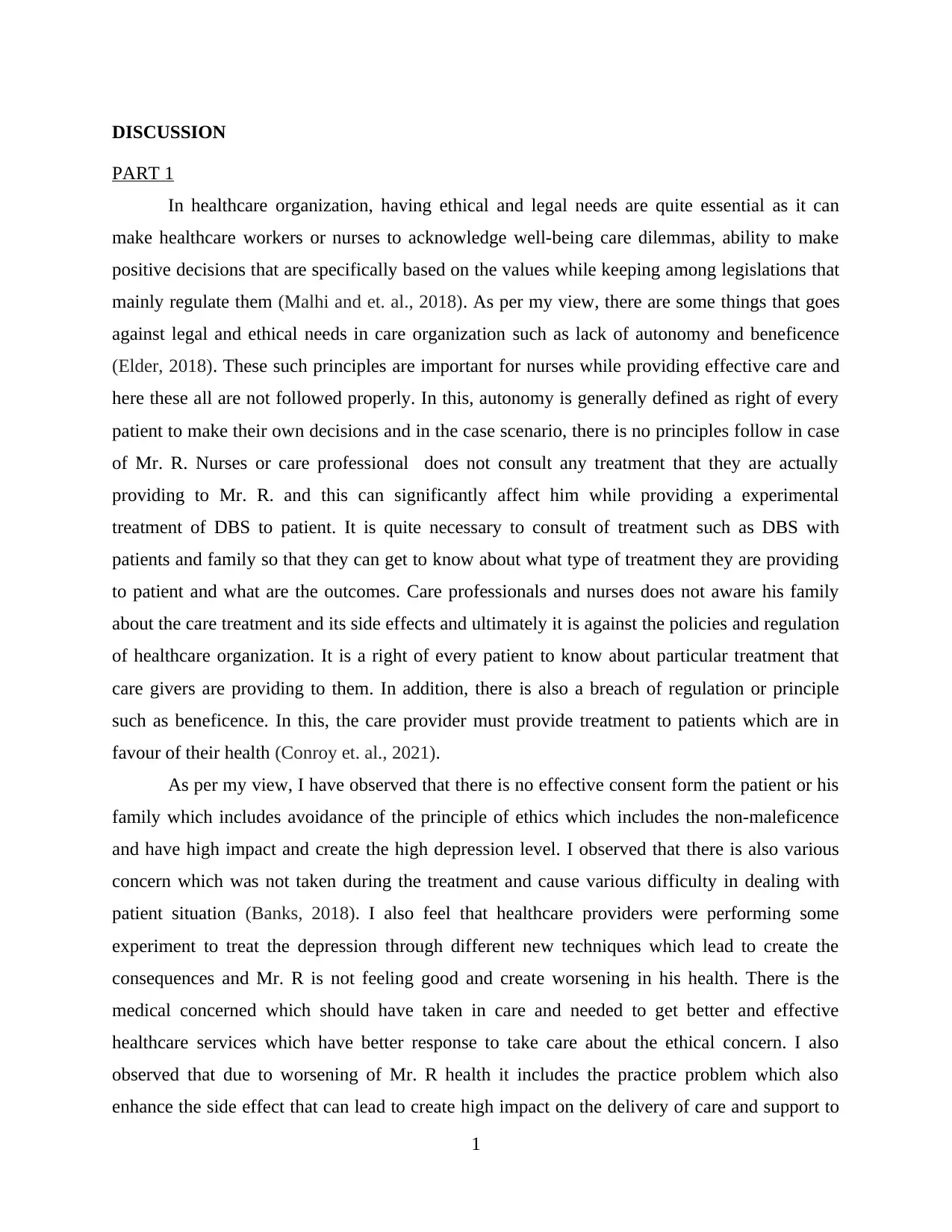
DISCUSSION
PART 1
In healthcare organization, having ethical and legal needs are quite essential as it can
make healthcare workers or nurses to acknowledge well-being care dilemmas, ability to make
positive decisions that are specifically based on the values while keeping among legislations that
mainly regulate them (Malhi and et. al., 2018). As per my view, there are some things that goes
against legal and ethical needs in care organization such as lack of autonomy and beneficence
(Elder, 2018). These such principles are important for nurses while providing effective care and
here these all are not followed properly. In this, autonomy is generally defined as right of every
patient to make their own decisions and in the case scenario, there is no principles follow in case
of Mr. R. Nurses or care professional does not consult any treatment that they are actually
providing to Mr. R. and this can significantly affect him while providing a experimental
treatment of DBS to patient. It is quite necessary to consult of treatment such as DBS with
patients and family so that they can get to know about what type of treatment they are providing
to patient and what are the outcomes. Care professionals and nurses does not aware his family
about the care treatment and its side effects and ultimately it is against the policies and regulation
of healthcare organization. It is a right of every patient to know about particular treatment that
care givers are providing to them. In addition, there is also a breach of regulation or principle
such as beneficence. In this, the care provider must provide treatment to patients which are in
favour of their health (Conroy et. al., 2021).
As per my view, I have observed that there is no effective consent form the patient or his
family which includes avoidance of the principle of ethics which includes the non-maleficence
and have high impact and create the high depression level. I observed that there is also various
concern which was not taken during the treatment and cause various difficulty in dealing with
patient situation (Banks, 2018). I also feel that healthcare providers were performing some
experiment to treat the depression through different new techniques which lead to create the
consequences and Mr. R is not feeling good and create worsening in his health. There is the
medical concerned which should have taken in care and needed to get better and effective
healthcare services which have better response to take care about the ethical concern. I also
observed that due to worsening of Mr. R health it includes the practice problem which also
enhance the side effect that can lead to create high impact on the delivery of care and support to
1
PART 1
In healthcare organization, having ethical and legal needs are quite essential as it can
make healthcare workers or nurses to acknowledge well-being care dilemmas, ability to make
positive decisions that are specifically based on the values while keeping among legislations that
mainly regulate them (Malhi and et. al., 2018). As per my view, there are some things that goes
against legal and ethical needs in care organization such as lack of autonomy and beneficence
(Elder, 2018). These such principles are important for nurses while providing effective care and
here these all are not followed properly. In this, autonomy is generally defined as right of every
patient to make their own decisions and in the case scenario, there is no principles follow in case
of Mr. R. Nurses or care professional does not consult any treatment that they are actually
providing to Mr. R. and this can significantly affect him while providing a experimental
treatment of DBS to patient. It is quite necessary to consult of treatment such as DBS with
patients and family so that they can get to know about what type of treatment they are providing
to patient and what are the outcomes. Care professionals and nurses does not aware his family
about the care treatment and its side effects and ultimately it is against the policies and regulation
of healthcare organization. It is a right of every patient to know about particular treatment that
care givers are providing to them. In addition, there is also a breach of regulation or principle
such as beneficence. In this, the care provider must provide treatment to patients which are in
favour of their health (Conroy et. al., 2021).
As per my view, I have observed that there is no effective consent form the patient or his
family which includes avoidance of the principle of ethics which includes the non-maleficence
and have high impact and create the high depression level. I observed that there is also various
concern which was not taken during the treatment and cause various difficulty in dealing with
patient situation (Banks, 2018). I also feel that healthcare providers were performing some
experiment to treat the depression through different new techniques which lead to create the
consequences and Mr. R is not feeling good and create worsening in his health. There is the
medical concerned which should have taken in care and needed to get better and effective
healthcare services which have better response to take care about the ethical concern. I also
observed that due to worsening of Mr. R health it includes the practice problem which also
enhance the side effect that can lead to create high impact on the delivery of care and support to
1
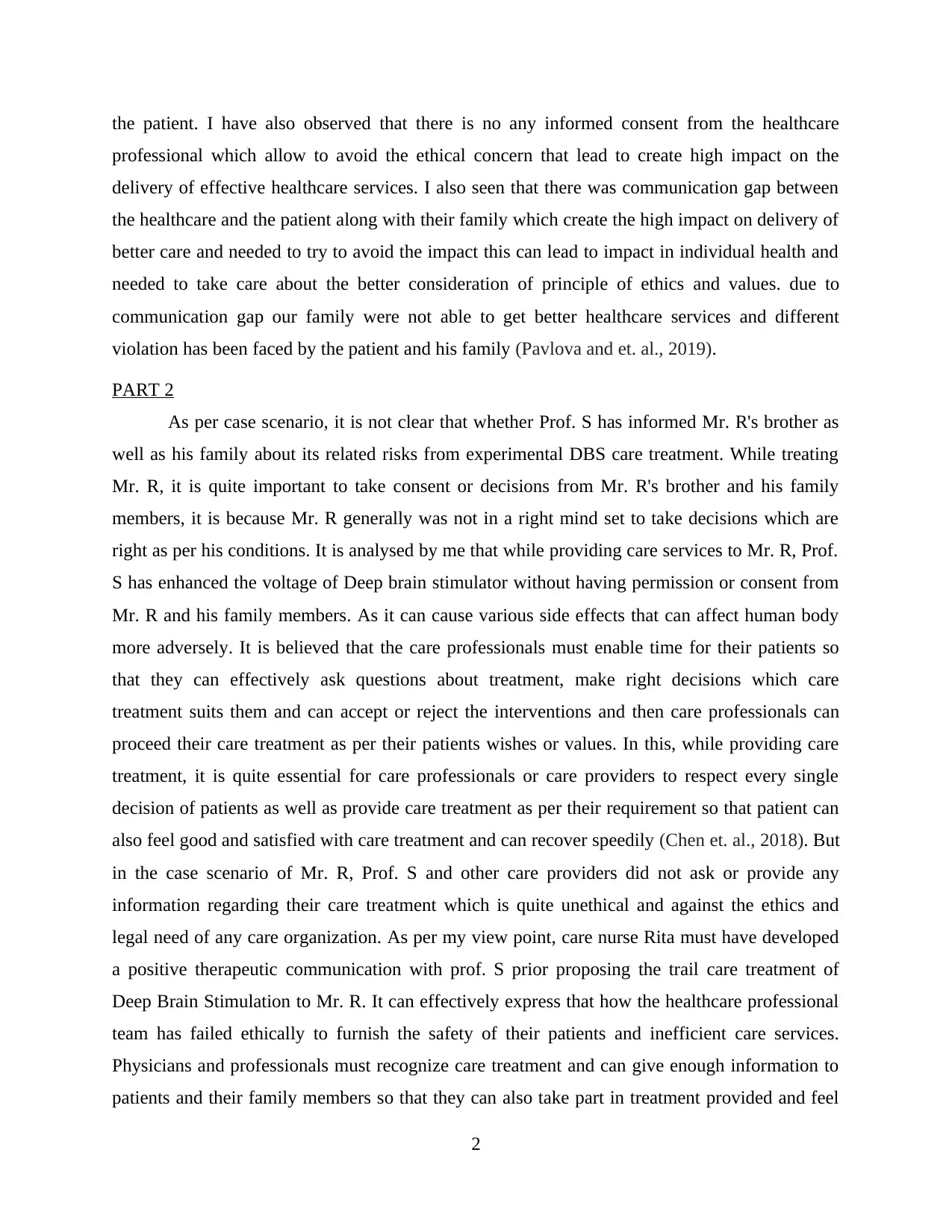
the patient. I have also observed that there is no any informed consent from the healthcare
professional which allow to avoid the ethical concern that lead to create high impact on the
delivery of effective healthcare services. I also seen that there was communication gap between
the healthcare and the patient along with their family which create the high impact on delivery of
better care and needed to try to avoid the impact this can lead to impact in individual health and
needed to take care about the better consideration of principle of ethics and values. due to
communication gap our family were not able to get better healthcare services and different
violation has been faced by the patient and his family (Pavlova and et. al., 2019).
PART 2
As per case scenario, it is not clear that whether Prof. S has informed Mr. R's brother as
well as his family about its related risks from experimental DBS care treatment. While treating
Mr. R, it is quite important to take consent or decisions from Mr. R's brother and his family
members, it is because Mr. R generally was not in a right mind set to take decisions which are
right as per his conditions. It is analysed by me that while providing care services to Mr. R, Prof.
S has enhanced the voltage of Deep brain stimulator without having permission or consent from
Mr. R and his family members. As it can cause various side effects that can affect human body
more adversely. It is believed that the care professionals must enable time for their patients so
that they can effectively ask questions about treatment, make right decisions which care
treatment suits them and can accept or reject the interventions and then care professionals can
proceed their care treatment as per their patients wishes or values. In this, while providing care
treatment, it is quite essential for care professionals or care providers to respect every single
decision of patients as well as provide care treatment as per their requirement so that patient can
also feel good and satisfied with care treatment and can recover speedily (Chen et. al., 2018). But
in the case scenario of Mr. R, Prof. S and other care providers did not ask or provide any
information regarding their care treatment which is quite unethical and against the ethics and
legal need of any care organization. As per my view point, care nurse Rita must have developed
a positive therapeutic communication with prof. S prior proposing the trail care treatment of
Deep Brain Stimulation to Mr. R. It can effectively express that how the healthcare professional
team has failed ethically to furnish the safety of their patients and inefficient care services.
Physicians and professionals must recognize care treatment and can give enough information to
patients and their family members so that they can also take part in treatment provided and feel
2
professional which allow to avoid the ethical concern that lead to create high impact on the
delivery of effective healthcare services. I also seen that there was communication gap between
the healthcare and the patient along with their family which create the high impact on delivery of
better care and needed to try to avoid the impact this can lead to impact in individual health and
needed to take care about the better consideration of principle of ethics and values. due to
communication gap our family were not able to get better healthcare services and different
violation has been faced by the patient and his family (Pavlova and et. al., 2019).
PART 2
As per case scenario, it is not clear that whether Prof. S has informed Mr. R's brother as
well as his family about its related risks from experimental DBS care treatment. While treating
Mr. R, it is quite important to take consent or decisions from Mr. R's brother and his family
members, it is because Mr. R generally was not in a right mind set to take decisions which are
right as per his conditions. It is analysed by me that while providing care services to Mr. R, Prof.
S has enhanced the voltage of Deep brain stimulator without having permission or consent from
Mr. R and his family members. As it can cause various side effects that can affect human body
more adversely. It is believed that the care professionals must enable time for their patients so
that they can effectively ask questions about treatment, make right decisions which care
treatment suits them and can accept or reject the interventions and then care professionals can
proceed their care treatment as per their patients wishes or values. In this, while providing care
treatment, it is quite essential for care professionals or care providers to respect every single
decision of patients as well as provide care treatment as per their requirement so that patient can
also feel good and satisfied with care treatment and can recover speedily (Chen et. al., 2018). But
in the case scenario of Mr. R, Prof. S and other care providers did not ask or provide any
information regarding their care treatment which is quite unethical and against the ethics and
legal need of any care organization. As per my view point, care nurse Rita must have developed
a positive therapeutic communication with prof. S prior proposing the trail care treatment of
Deep Brain Stimulation to Mr. R. It can effectively express that how the healthcare professional
team has failed ethically to furnish the safety of their patients and inefficient care services.
Physicians and professionals must recognize care treatment and can give enough information to
patients and their family members so that they can also take part in treatment provided and feel
2
Secure Best Marks with AI Grader
Need help grading? Try our AI Grader for instant feedback on your assignments.
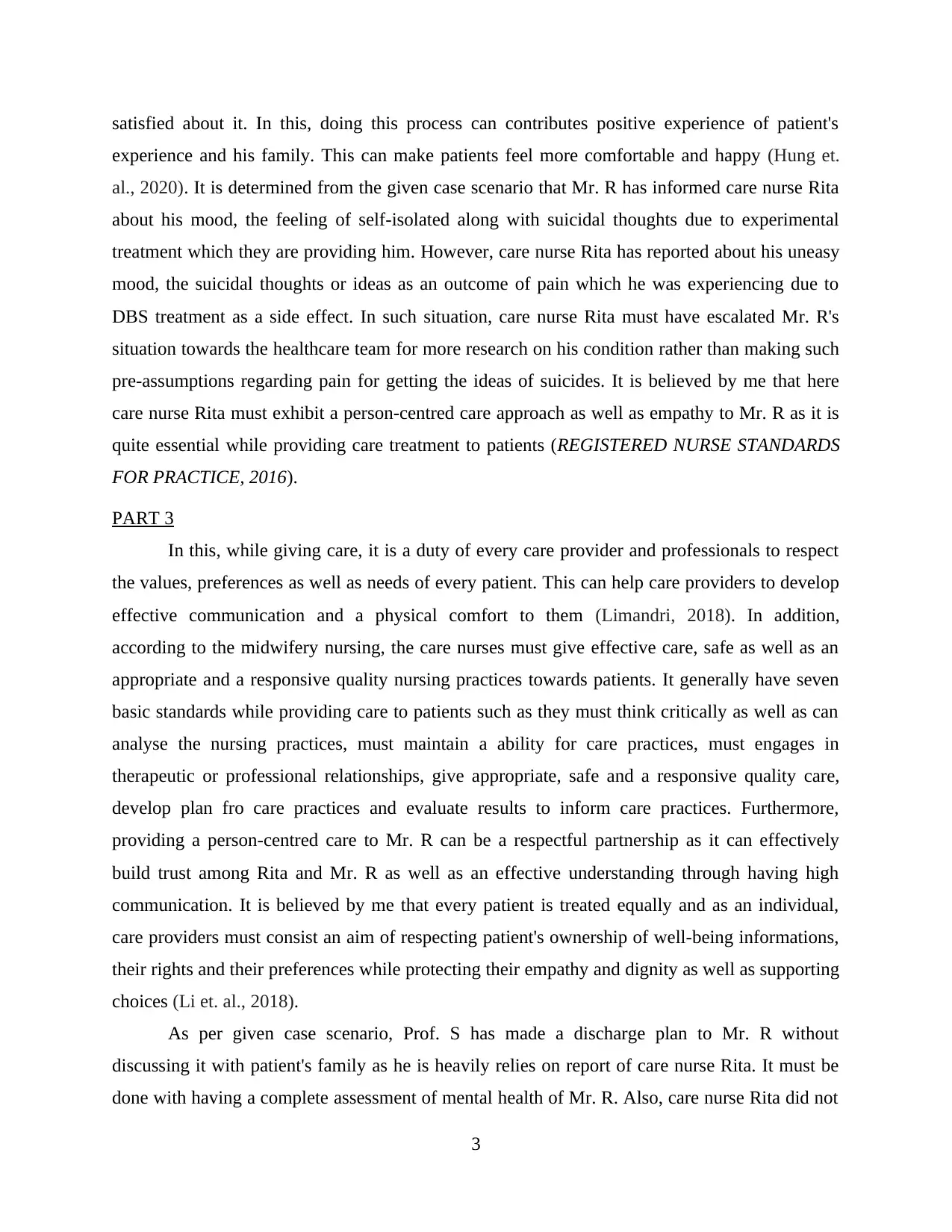
satisfied about it. In this, doing this process can contributes positive experience of patient's
experience and his family. This can make patients feel more comfortable and happy (Hung et.
al., 2020). It is determined from the given case scenario that Mr. R has informed care nurse Rita
about his mood, the feeling of self-isolated along with suicidal thoughts due to experimental
treatment which they are providing him. However, care nurse Rita has reported about his uneasy
mood, the suicidal thoughts or ideas as an outcome of pain which he was experiencing due to
DBS treatment as a side effect. In such situation, care nurse Rita must have escalated Mr. R's
situation towards the healthcare team for more research on his condition rather than making such
pre-assumptions regarding pain for getting the ideas of suicides. It is believed by me that here
care nurse Rita must exhibit a person-centred care approach as well as empathy to Mr. R as it is
quite essential while providing care treatment to patients (REGISTERED NURSE STANDARDS
FOR PRACTICE, 2016).
PART 3
In this, while giving care, it is a duty of every care provider and professionals to respect
the values, preferences as well as needs of every patient. This can help care providers to develop
effective communication and a physical comfort to them (Limandri, 2018). In addition,
according to the midwifery nursing, the care nurses must give effective care, safe as well as an
appropriate and a responsive quality nursing practices towards patients. It generally have seven
basic standards while providing care to patients such as they must think critically as well as can
analyse the nursing practices, must maintain a ability for care practices, must engages in
therapeutic or professional relationships, give appropriate, safe and a responsive quality care,
develop plan fro care practices and evaluate results to inform care practices. Furthermore,
providing a person-centred care to Mr. R can be a respectful partnership as it can effectively
build trust among Rita and Mr. R as well as an effective understanding through having high
communication. It is believed by me that every patient is treated equally and as an individual,
care providers must consist an aim of respecting patient's ownership of well-being informations,
their rights and their preferences while protecting their empathy and dignity as well as supporting
choices (Li et. al., 2018).
As per given case scenario, Prof. S has made a discharge plan to Mr. R without
discussing it with patient's family as he is heavily relies on report of care nurse Rita. It must be
done with having a complete assessment of mental health of Mr. R. Also, care nurse Rita did not
3
experience and his family. This can make patients feel more comfortable and happy (Hung et.
al., 2020). It is determined from the given case scenario that Mr. R has informed care nurse Rita
about his mood, the feeling of self-isolated along with suicidal thoughts due to experimental
treatment which they are providing him. However, care nurse Rita has reported about his uneasy
mood, the suicidal thoughts or ideas as an outcome of pain which he was experiencing due to
DBS treatment as a side effect. In such situation, care nurse Rita must have escalated Mr. R's
situation towards the healthcare team for more research on his condition rather than making such
pre-assumptions regarding pain for getting the ideas of suicides. It is believed by me that here
care nurse Rita must exhibit a person-centred care approach as well as empathy to Mr. R as it is
quite essential while providing care treatment to patients (REGISTERED NURSE STANDARDS
FOR PRACTICE, 2016).
PART 3
In this, while giving care, it is a duty of every care provider and professionals to respect
the values, preferences as well as needs of every patient. This can help care providers to develop
effective communication and a physical comfort to them (Limandri, 2018). In addition,
according to the midwifery nursing, the care nurses must give effective care, safe as well as an
appropriate and a responsive quality nursing practices towards patients. It generally have seven
basic standards while providing care to patients such as they must think critically as well as can
analyse the nursing practices, must maintain a ability for care practices, must engages in
therapeutic or professional relationships, give appropriate, safe and a responsive quality care,
develop plan fro care practices and evaluate results to inform care practices. Furthermore,
providing a person-centred care to Mr. R can be a respectful partnership as it can effectively
build trust among Rita and Mr. R as well as an effective understanding through having high
communication. It is believed by me that every patient is treated equally and as an individual,
care providers must consist an aim of respecting patient's ownership of well-being informations,
their rights and their preferences while protecting their empathy and dignity as well as supporting
choices (Li et. al., 2018).
As per given case scenario, Prof. S has made a discharge plan to Mr. R without
discussing it with patient's family as he is heavily relies on report of care nurse Rita. It must be
done with having a complete assessment of mental health of Mr. R. Also, care nurse Rita did not
3
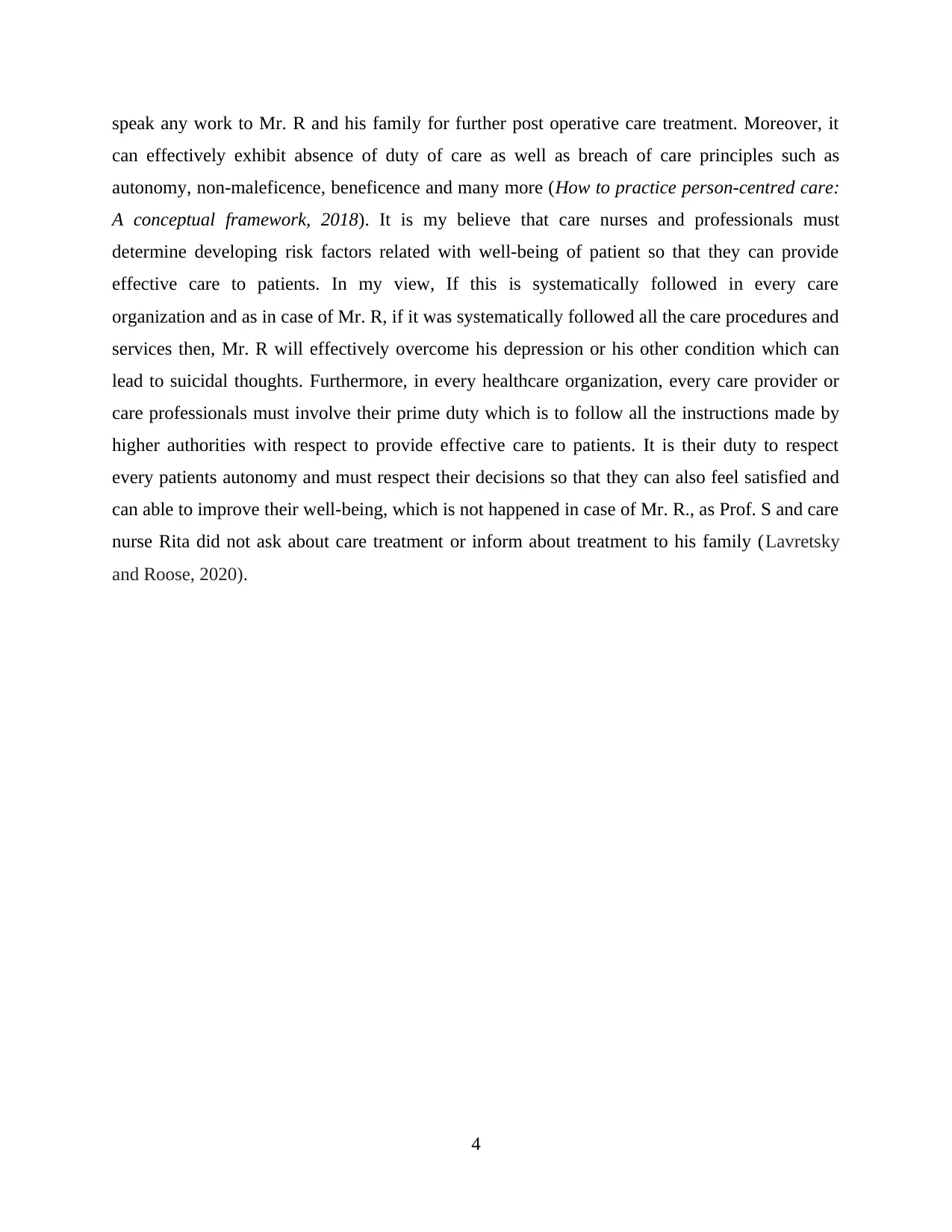
speak any work to Mr. R and his family for further post operative care treatment. Moreover, it
can effectively exhibit absence of duty of care as well as breach of care principles such as
autonomy, non-maleficence, beneficence and many more (How to practice person‐centred care:
A conceptual framework, 2018). It is my believe that care nurses and professionals must
determine developing risk factors related with well-being of patient so that they can provide
effective care to patients. In my view, If this is systematically followed in every care
organization and as in case of Mr. R, if it was systematically followed all the care procedures and
services then, Mr. R will effectively overcome his depression or his other condition which can
lead to suicidal thoughts. Furthermore, in every healthcare organization, every care provider or
care professionals must involve their prime duty which is to follow all the instructions made by
higher authorities with respect to provide effective care to patients. It is their duty to respect
every patients autonomy and must respect their decisions so that they can also feel satisfied and
can able to improve their well-being, which is not happened in case of Mr. R., as Prof. S and care
nurse Rita did not ask about care treatment or inform about treatment to his family (Lavretsky
and Roose, 2020).
4
can effectively exhibit absence of duty of care as well as breach of care principles such as
autonomy, non-maleficence, beneficence and many more (How to practice person‐centred care:
A conceptual framework, 2018). It is my believe that care nurses and professionals must
determine developing risk factors related with well-being of patient so that they can provide
effective care to patients. In my view, If this is systematically followed in every care
organization and as in case of Mr. R, if it was systematically followed all the care procedures and
services then, Mr. R will effectively overcome his depression or his other condition which can
lead to suicidal thoughts. Furthermore, in every healthcare organization, every care provider or
care professionals must involve their prime duty which is to follow all the instructions made by
higher authorities with respect to provide effective care to patients. It is their duty to respect
every patients autonomy and must respect their decisions so that they can also feel satisfied and
can able to improve their well-being, which is not happened in case of Mr. R., as Prof. S and care
nurse Rita did not ask about care treatment or inform about treatment to his family (Lavretsky
and Roose, 2020).
4
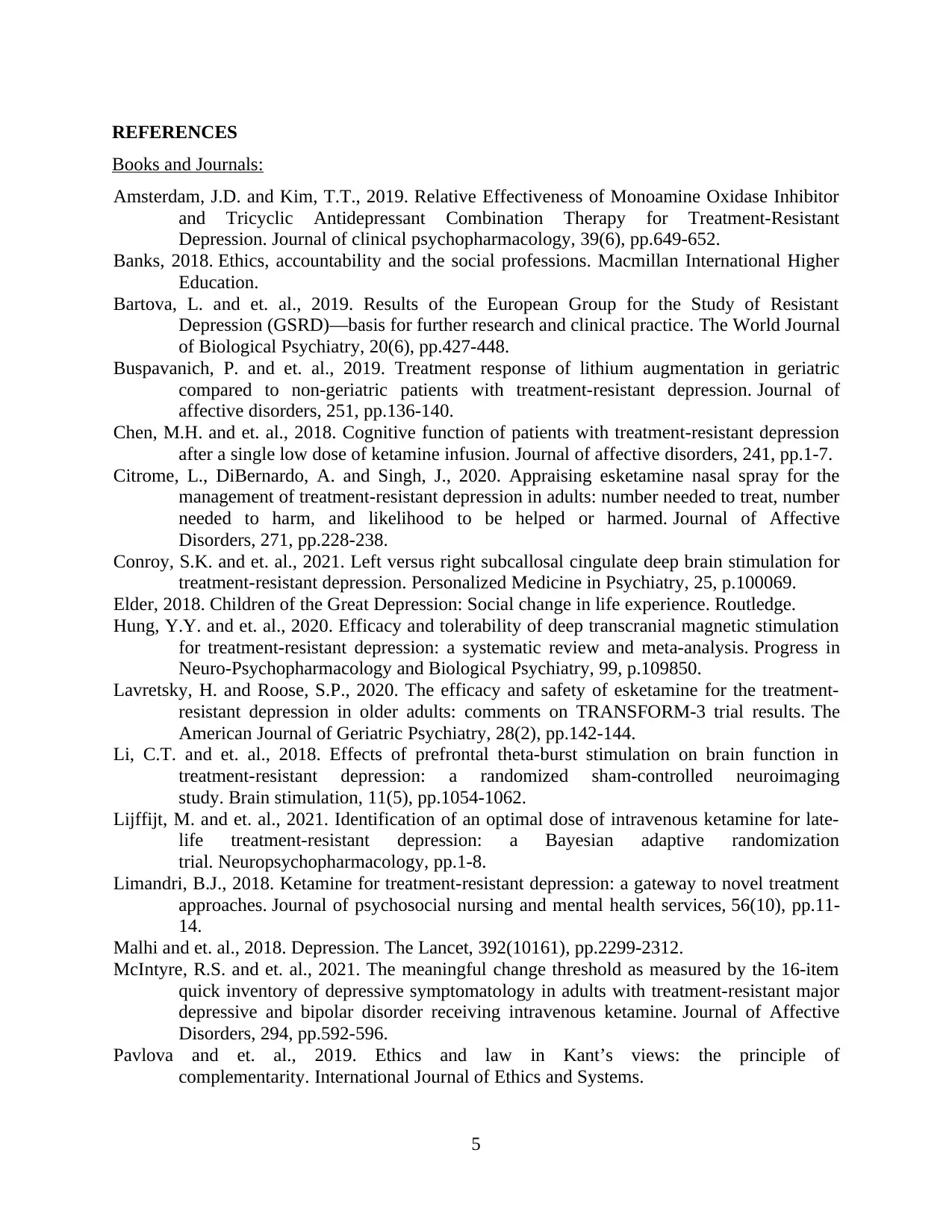
REFERENCES
Books and Journals:
Amsterdam, J.D. and Kim, T.T., 2019. Relative Effectiveness of Monoamine Oxidase Inhibitor
and Tricyclic Antidepressant Combination Therapy for Treatment-Resistant
Depression. Journal of clinical psychopharmacology, 39(6), pp.649-652.
Banks, 2018. Ethics, accountability and the social professions. Macmillan International Higher
Education.
Bartova, L. and et. al., 2019. Results of the European Group for the Study of Resistant
Depression (GSRD)—basis for further research and clinical practice. The World Journal
of Biological Psychiatry, 20(6), pp.427-448.
Buspavanich, P. and et. al., 2019. Treatment response of lithium augmentation in geriatric
compared to non-geriatric patients with treatment-resistant depression. Journal of
affective disorders, 251, pp.136-140.
Chen, M.H. and et. al., 2018. Cognitive function of patients with treatment-resistant depression
after a single low dose of ketamine infusion. Journal of affective disorders, 241, pp.1-7.
Citrome, L., DiBernardo, A. and Singh, J., 2020. Appraising esketamine nasal spray for the
management of treatment-resistant depression in adults: number needed to treat, number
needed to harm, and likelihood to be helped or harmed. Journal of Affective
Disorders, 271, pp.228-238.
Conroy, S.K. and et. al., 2021. Left versus right subcallosal cingulate deep brain stimulation for
treatment-resistant depression. Personalized Medicine in Psychiatry, 25, p.100069.
Elder, 2018. Children of the Great Depression: Social change in life experience. Routledge.
Hung, Y.Y. and et. al., 2020. Efficacy and tolerability of deep transcranial magnetic stimulation
for treatment-resistant depression: a systematic review and meta-analysis. Progress in
Neuro-Psychopharmacology and Biological Psychiatry, 99, p.109850.
Lavretsky, H. and Roose, S.P., 2020. The efficacy and safety of esketamine for the treatment-
resistant depression in older adults: comments on TRANSFORM-3 trial results. The
American Journal of Geriatric Psychiatry, 28(2), pp.142-144.
Li, C.T. and et. al., 2018. Effects of prefrontal theta-burst stimulation on brain function in
treatment-resistant depression: a randomized sham-controlled neuroimaging
study. Brain stimulation, 11(5), pp.1054-1062.
Lijffijt, M. and et. al., 2021. Identification of an optimal dose of intravenous ketamine for late-
life treatment-resistant depression: a Bayesian adaptive randomization
trial. Neuropsychopharmacology, pp.1-8.
Limandri, B.J., 2018. Ketamine for treatment-resistant depression: a gateway to novel treatment
approaches. Journal of psychosocial nursing and mental health services, 56(10), pp.11-
14.
Malhi and et. al., 2018. Depression. The Lancet, 392(10161), pp.2299-2312.
McIntyre, R.S. and et. al., 2021. The meaningful change threshold as measured by the 16-item
quick inventory of depressive symptomatology in adults with treatment-resistant major
depressive and bipolar disorder receiving intravenous ketamine. Journal of Affective
Disorders, 294, pp.592-596.
Pavlova and et. al., 2019. Ethics and law in Kant’s views: the principle of
complementarity. International Journal of Ethics and Systems.
5
Books and Journals:
Amsterdam, J.D. and Kim, T.T., 2019. Relative Effectiveness of Monoamine Oxidase Inhibitor
and Tricyclic Antidepressant Combination Therapy for Treatment-Resistant
Depression. Journal of clinical psychopharmacology, 39(6), pp.649-652.
Banks, 2018. Ethics, accountability and the social professions. Macmillan International Higher
Education.
Bartova, L. and et. al., 2019. Results of the European Group for the Study of Resistant
Depression (GSRD)—basis for further research and clinical practice. The World Journal
of Biological Psychiatry, 20(6), pp.427-448.
Buspavanich, P. and et. al., 2019. Treatment response of lithium augmentation in geriatric
compared to non-geriatric patients with treatment-resistant depression. Journal of
affective disorders, 251, pp.136-140.
Chen, M.H. and et. al., 2018. Cognitive function of patients with treatment-resistant depression
after a single low dose of ketamine infusion. Journal of affective disorders, 241, pp.1-7.
Citrome, L., DiBernardo, A. and Singh, J., 2020. Appraising esketamine nasal spray for the
management of treatment-resistant depression in adults: number needed to treat, number
needed to harm, and likelihood to be helped or harmed. Journal of Affective
Disorders, 271, pp.228-238.
Conroy, S.K. and et. al., 2021. Left versus right subcallosal cingulate deep brain stimulation for
treatment-resistant depression. Personalized Medicine in Psychiatry, 25, p.100069.
Elder, 2018. Children of the Great Depression: Social change in life experience. Routledge.
Hung, Y.Y. and et. al., 2020. Efficacy and tolerability of deep transcranial magnetic stimulation
for treatment-resistant depression: a systematic review and meta-analysis. Progress in
Neuro-Psychopharmacology and Biological Psychiatry, 99, p.109850.
Lavretsky, H. and Roose, S.P., 2020. The efficacy and safety of esketamine for the treatment-
resistant depression in older adults: comments on TRANSFORM-3 trial results. The
American Journal of Geriatric Psychiatry, 28(2), pp.142-144.
Li, C.T. and et. al., 2018. Effects of prefrontal theta-burst stimulation on brain function in
treatment-resistant depression: a randomized sham-controlled neuroimaging
study. Brain stimulation, 11(5), pp.1054-1062.
Lijffijt, M. and et. al., 2021. Identification of an optimal dose of intravenous ketamine for late-
life treatment-resistant depression: a Bayesian adaptive randomization
trial. Neuropsychopharmacology, pp.1-8.
Limandri, B.J., 2018. Ketamine for treatment-resistant depression: a gateway to novel treatment
approaches. Journal of psychosocial nursing and mental health services, 56(10), pp.11-
14.
Malhi and et. al., 2018. Depression. The Lancet, 392(10161), pp.2299-2312.
McIntyre, R.S. and et. al., 2021. The meaningful change threshold as measured by the 16-item
quick inventory of depressive symptomatology in adults with treatment-resistant major
depressive and bipolar disorder receiving intravenous ketamine. Journal of Affective
Disorders, 294, pp.592-596.
Pavlova and et. al., 2019. Ethics and law in Kant’s views: the principle of
complementarity. International Journal of Ethics and Systems.
5
Paraphrase This Document
Need a fresh take? Get an instant paraphrase of this document with our AI Paraphraser
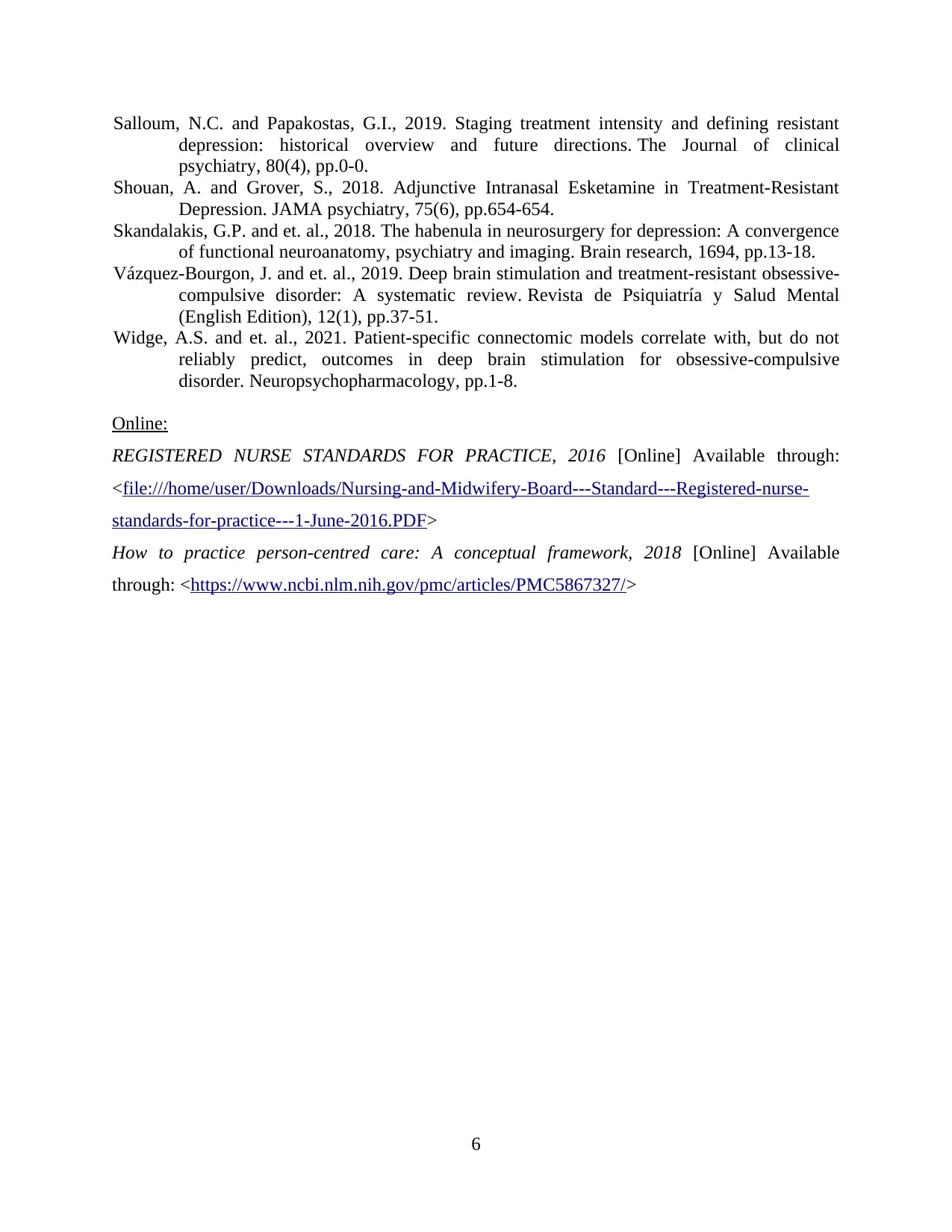
Salloum, N.C. and Papakostas, G.I., 2019. Staging treatment intensity and defining resistant
depression: historical overview and future directions. The Journal of clinical
psychiatry, 80(4), pp.0-0.
Shouan, A. and Grover, S., 2018. Adjunctive Intranasal Esketamine in Treatment-Resistant
Depression. JAMA psychiatry, 75(6), pp.654-654.
Skandalakis, G.P. and et. al., 2018. The habenula in neurosurgery for depression: A convergence
of functional neuroanatomy, psychiatry and imaging. Brain research, 1694, pp.13-18.
Vázquez-Bourgon, J. and et. al., 2019. Deep brain stimulation and treatment-resistant obsessive-
compulsive disorder: A systematic review. Revista de Psiquiatría y Salud Mental
(English Edition), 12(1), pp.37-51.
Widge, A.S. and et. al., 2021. Patient-specific connectomic models correlate with, but do not
reliably predict, outcomes in deep brain stimulation for obsessive-compulsive
disorder. Neuropsychopharmacology, pp.1-8.
Online:
REGISTERED NURSE STANDARDS FOR PRACTICE, 2016 [Online] Available through:
<file:///home/user/Downloads/Nursing-and-Midwifery-Board---Standard---Registered-nurse-
standards-for-practice---1-June-2016.PDF>
How to practice person‐centred care: A conceptual framework, 2018 [Online] Available
through: <https://www.ncbi.nlm.nih.gov/pmc/articles/PMC5867327/>
6
depression: historical overview and future directions. The Journal of clinical
psychiatry, 80(4), pp.0-0.
Shouan, A. and Grover, S., 2018. Adjunctive Intranasal Esketamine in Treatment-Resistant
Depression. JAMA psychiatry, 75(6), pp.654-654.
Skandalakis, G.P. and et. al., 2018. The habenula in neurosurgery for depression: A convergence
of functional neuroanatomy, psychiatry and imaging. Brain research, 1694, pp.13-18.
Vázquez-Bourgon, J. and et. al., 2019. Deep brain stimulation and treatment-resistant obsessive-
compulsive disorder: A systematic review. Revista de Psiquiatría y Salud Mental
(English Edition), 12(1), pp.37-51.
Widge, A.S. and et. al., 2021. Patient-specific connectomic models correlate with, but do not
reliably predict, outcomes in deep brain stimulation for obsessive-compulsive
disorder. Neuropsychopharmacology, pp.1-8.
Online:
REGISTERED NURSE STANDARDS FOR PRACTICE, 2016 [Online] Available through:
<file:///home/user/Downloads/Nursing-and-Midwifery-Board---Standard---Registered-nurse-
standards-for-practice---1-June-2016.PDF>
How to practice person‐centred care: A conceptual framework, 2018 [Online] Available
through: <https://www.ncbi.nlm.nih.gov/pmc/articles/PMC5867327/>
6
1 out of 8
Related Documents
Your All-in-One AI-Powered Toolkit for Academic Success.
+13062052269
info@desklib.com
Available 24*7 on WhatsApp / Email
![[object Object]](/_next/static/media/star-bottom.7253800d.svg)
Unlock your academic potential
© 2024 | Zucol Services PVT LTD | All rights reserved.





